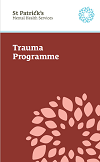The Trauma Programme aims to support people who have had experiences of trauma and adverse childhood experiences.
Trauma can be understood as an inescapably stressful event that overwhelms a person’s existing coping mechanisms. These experiences can be unspeakable and can have an ongoing, haunting presence in the person’s life.
The Trauma Programme in St Patrick’s Mental Health Services (SPMHS) is a group-based programme designed for people who have experienced trauma. It is intended that people feel a sense of safeness and connection within the group. This connection supports group members to develop a compassionate mind, which helps them to safely revisit the past and to not feel alone. The aim of revisiting past traumas is to improve life in the present and future.
During the Trauma Programme, service users will attend both group and individual therapy sessions over different stages. The group elements include trauma psychoeducation, compassionate imagery exercises, safely embodied skills, and memory processing work. The individual therapy offers a range of evidence-based trauma memory therapy.
This is a day programme which takes place twice a week over seven months, and is run by a team of two psychologists and an assistant psychologist. It typically takes place in an in-person format, based in St Patrick’s University Hospital in Dublin 8.
Places in the Trauma Programme are currently available only to service users under the care of a consultant psychiatrist in SPMHS. If you are receiving care in SPMHS and are interested in taking part in the programme, please speak to your multidisciplinary team: your team psychologist may meet with you and assess if the Trauma Programme would be suitable for you.
See our Trauma Programme brochure for more information.



